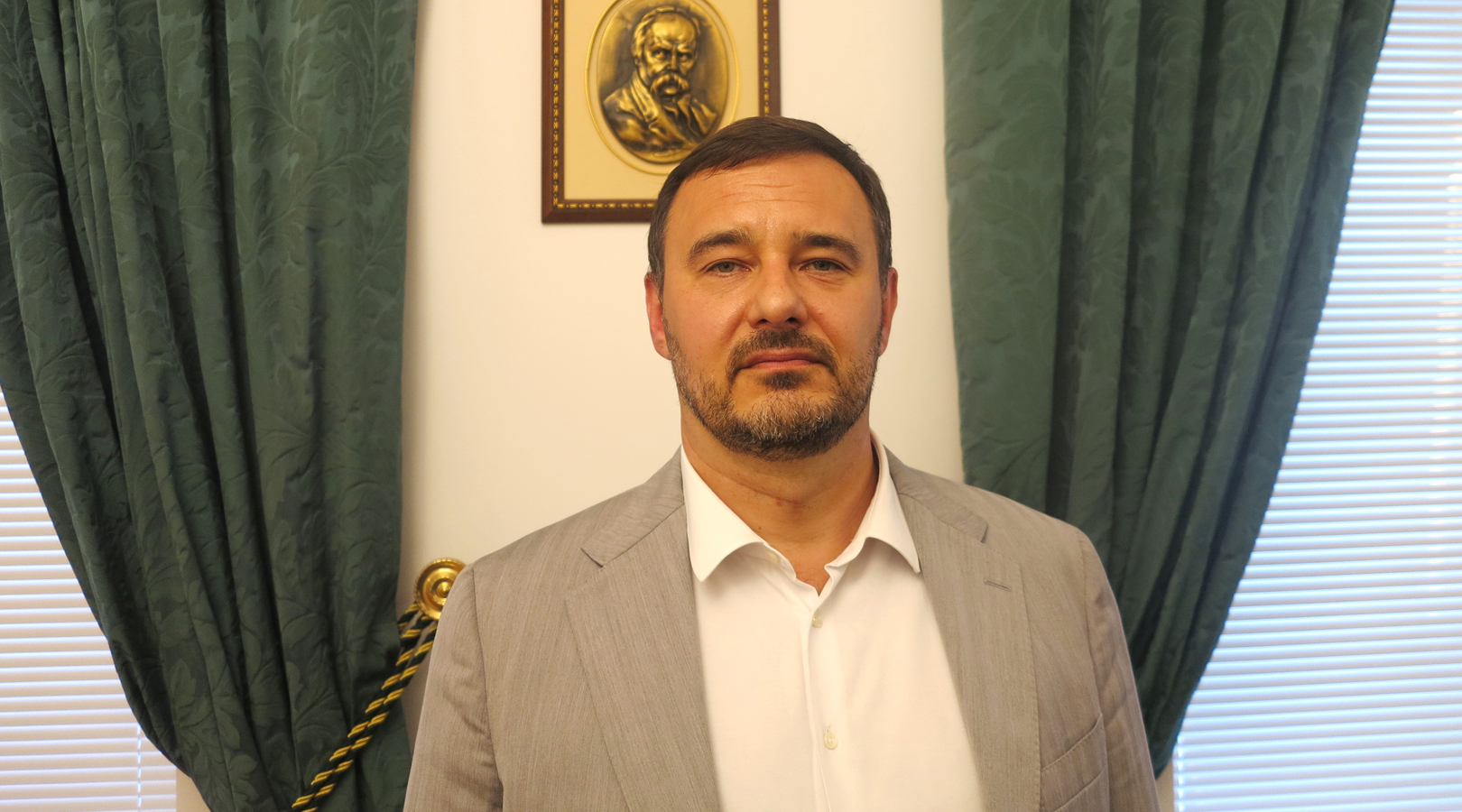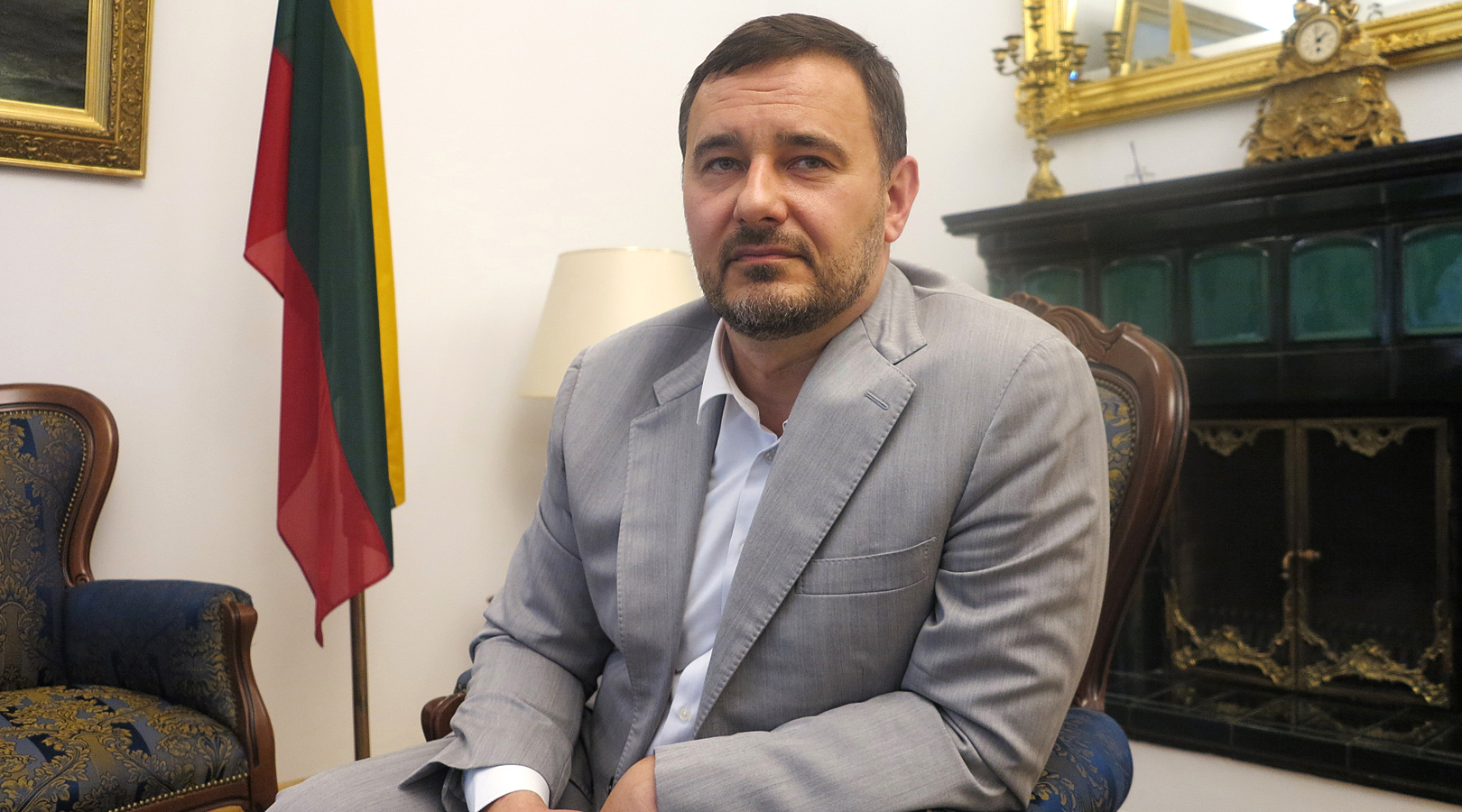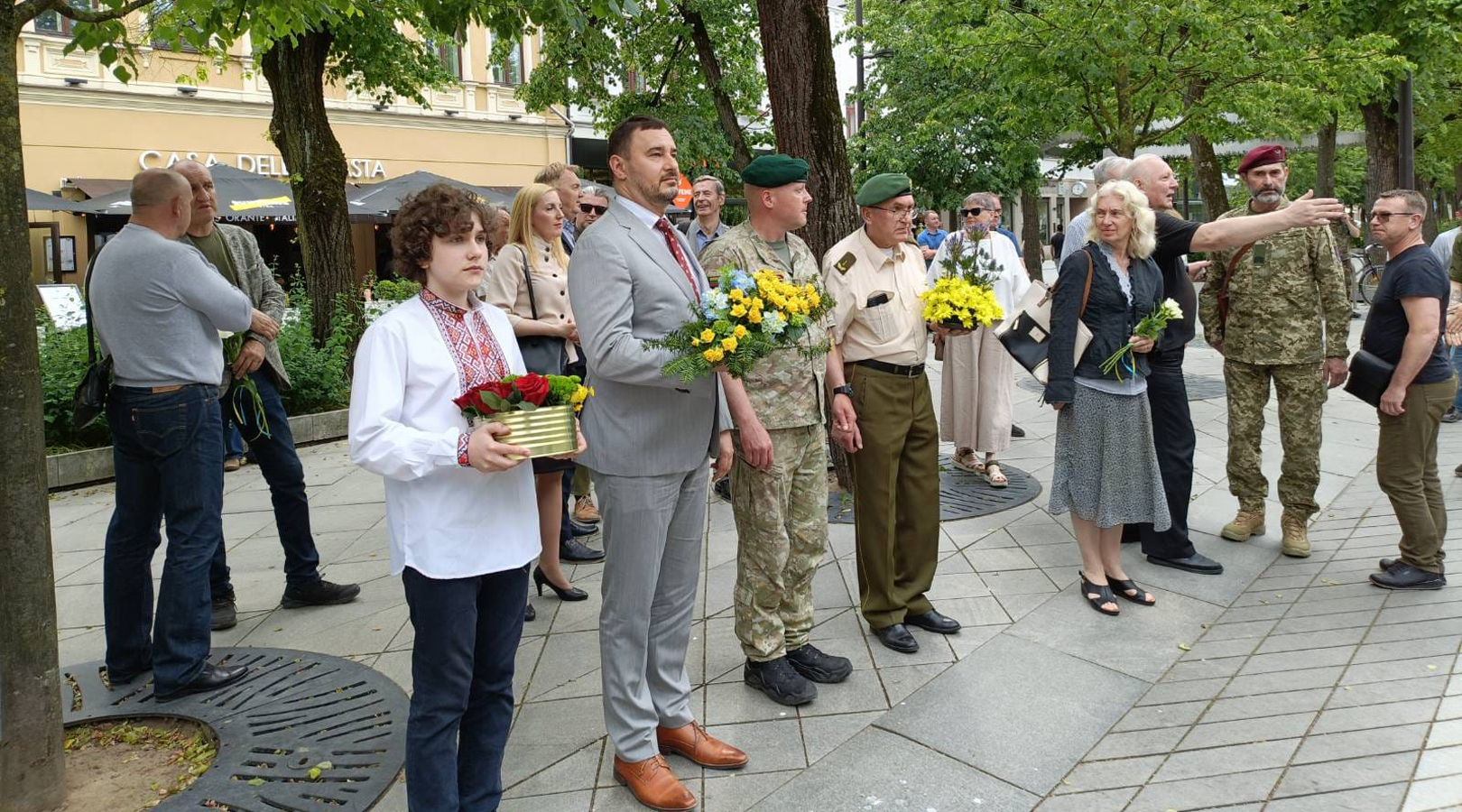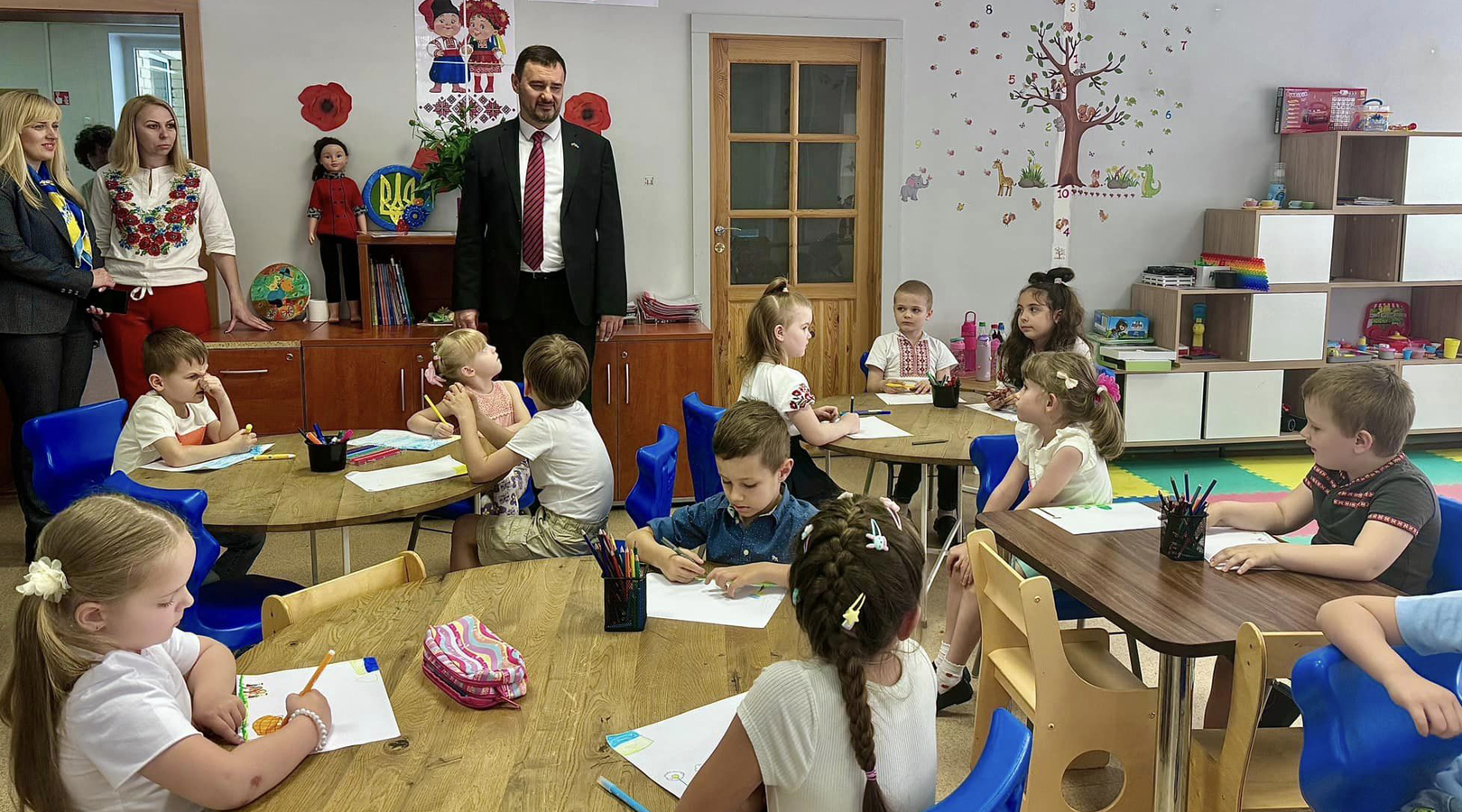Petro Beshta was appointed Ukraine’s ambassador to Lithuania two and a half years ago, following a tenure as head of the Ministry of Foreign Affairs’ Political Directorate. A reasonable decision was made in anticipation of the 2023 NATO Vilnius Summit: to appoint to that position a person with this broad-ranging knowledge of foreign policy and relations.
In an Ukrinform interview, the ambassador was talking about the importance of the results achieved at the end of last year's NATO summit, shared his expectations from the NATO 75th anniversary summit, which will be held in July 2024 in Washington D.C., and elaborated on cooperation between Ukraine and Lithuania, one of our closest partners.
AT THE TIME OF 2023 NATO VILNIUS SUMMIT, LITHUANIANS STAGED SEVERAL INFORMATION CAMPAIGNS IN SUPPORT OF UKRAINE
- You were appointed Ambassador of Ukraine to Lithuania at the beginning of 2022. What were your expectations regarding this appointment, to what extent did they come true?
- Everyone knows: the Baltic Sea countries are our closest allies. I as a diplomat have long known about our partnership with Lithuania, which has been very close since independence. But after I arrived in Lithuania, I saw how sizeable, extensive, and comprehensive this partnership is. One can say that I have discovered Lithuania for myself as a country, a nation. It turned out that they are even closer to us than I thought they are before coming here...
It is crucial to understand the very nature of our partnership, which is not just strategic, but in some ways truly remarkable. Lithuania is helping Ukraine in everything it can, now and in the long term. That country is two hundred percent committed to the earliest possible achievement of a victory by Ukraine. Lithuanians thoroughly understand our interests and the risks facing us. They are aspiring to help wherever and however they can, without setting any preconditions or restrictions (which is the case in relationships with some of our other partners). Not only do the Lithuanians work as hard as possible at the governmental level, but are showing miracles of public mobilization which no other country has so far been able to replicate. This is relating to the volunteer movement, fundraising, which are unprecedented, as well as the assistance provided at the level of municipalities and communities.
- You came to Lithuania to serve your tenure as Ukraine’s ambassador shortly before the 2023 NATO Vilnius Summit. What do you remember most from that extremely important event?
- The summit did not bring about all the results we were looking for. But as far as the Lithuanians are concerned, they did everything they could and even more to help us. Being the Summit hosting country, they were supporting Ukraine throughout all the preparation for the event.

- But what about during the event?
- The host party does not have special rights or opportunities to influence the political process taking place during such events. But they strived as much as possible to facilitate, with informational and emotional support, the coalition of the states that advocate Ukraine’s aspirations for NATO membership. The Lithuanians approached this creatively. There was a broad range of information campaigns staged at the time of the meeting. One such was a mobile Internet advertising campaign. The guests and participants of the summit were offered to "use the fastest Lithuanian Internet to expedite Ukraine’s accession to NATO"! Furthermore, large posters and banners in support of Ukraine's NATO membership were displayed all along the Vilnius Airport Highway so that they are visible to all the people travelling to the event.
In anticipation of the NATO summit, the renowned journalist Edmundas Yakilaitis, joined with Swedish journalist and volunteer Jonas Ohman (who leads the "Blue-Yellow" fundraising organization), were able to mobilize people to raise 33,000 Ukrainian flags throughout the country, with 33 of them carrying the inscription "Ukraine is the 33rd member of NATO."
- I see lots of Ukrainian flags flown across Vilnius even now, one year past the event.
- Yes, they are everywhere: on the streets, windows, people's balconies, and this is how it has been since the break-out the full-scale war. But then, in July 2023, there were even more of them. And there was another flag, especially valuable. The campaign "Raise the flag for Ukraine in NATO" lasted several months. It included athletes, Olympians running in a relay race carrying battle flags from the front line, from Bakhmut, to Kyiv, then further to the Polish border and finally to Vilnius. When Volodymyr Zelensky arrived in Vilnius on July 11, the greatest rally since the struggle for independence restoration gathered in central Vilnius. Ukrainian and Lithuanian Presidents attended the gathering and delivered speeches, and it was then when a battle flag was ceremoniously raised on the main flagpole in Vilnius. It was a broad-reaching information campaign that received a lot of publicity.
WORK ON A DRAFT COMMUNIQUE FOR NATO WASHINGTON SUMMIT IS IN PROGRESS
- How would you generally assess the results of the NATO Vilnius Summit?
- Despite the fact that we failed to achieve all of the goals we set for ourselves, I believe that the result achieved was important in some of its aspects. Previously, never had Ukraine enjoyed that broad support from the governments of NATO Allies regarding our membership. As early as five years ago it was unimaginable that there will be left only three Members that oppose Ukraine’s immediate accession to NATO... At that time, such a situation looked fantastic: we always counted votes in our favor. Five Allies, then nine... At Vilnius, the situation was crystallized by the Alliance, when only few Allies spoke out against an invitation for Ukraine to join NATO. That’s to say, we have risen to an entirely new level, and the challenge now is to convince these several major influential Allies into changing their minds.
- Everyone is already thinking about how the NATO 75th anniversary Washington summit will end up. What are your thoughts on this matter?
- Lithuania is going to definitely follow the line set out by last year's summit. The Ukrainian side, joined with its partners, will work to ensure that the Washington Summit place on record several important things. First and foremost, this is about the irreversibility of Ukraine's path to NATO membership. This will be of particular importance in case we fail to get an "invitation", that is, the word "invitation" should be clearly enshrined in the Summit’s final communique. For this purpose, work is currently in progress to find such a wording, such a formulation that could satisfy all of NATO’s Allies. In this context, it would be appropriate to place two things on record. First, it is extremely essential that the decisions to be made at the 2024 Washington Summit are more favorable [to Ukraine] than they were at Vilnius-2023. This must corroborate and specify what is called a "bridge" to Ukraine's NATO membership, that some progress has been achieved. Secondly, it would be expedient to make sure the Alliance’s vision that Ukrainian defense is vital for the Euro-Atlantic community, for the security of NATO as a whole be laid down into the final communique at Washington.
- Could you elaborate why this is important?
- This visioni is to mobilize the Euro-Atlantic community and make the assistance provided by NATO and Members more predictable, steady, and smooth going so that Ukraine gets all the weapons it needs faster, in greater quantities and continually, and that this security aid to Ukraine is provided in a more predictable and efficient manner rather than in response to each individual request or initiative as is the case now. Therefore, we are making a lot of efforts to make sure that the receipt of resources and armaments from NATO Members evolves into a steady, sustainable, vigorous process. It is extremely vital for the front line, for our military, for victory - predictability and the ability to plan our actions. For this to happen, there should be an understanding of what resources will have to be available and when... Also important are bilateral security agreements containing assurances for all these things. On top of that, the Ukrainian diplomatic corps will be struggling to ensure a significant bolstering of Ukraine’s air defense capability, particularly with more Patriot systems. This all will, among other things, comprise the focus of the agenda for the Washington summit.
It is also worth emphasizing that the aforementioned long-term systemic support for Ukraine in no way substitutes for our country’s acquisition of NATO membership, which remains to be the number-one goal. These are complementary processes.

MILITARY TECHNOLOGY COOPERATION BETWEEN UKRAINE AND LITHUANIA IS NOT LIMITED TO "BUY-SELL" DEALS
- Let's return to bilateral relations. How is Ukrainian-Lithuanian cooperation in military technology developing?
- This avenue of bilateral cooperation is very important as well. As a matter of fact, this is part of our security guarantee for the future. The availability of a highly developed military-industrial complex, of modern defense and security technologies is a vital necessity for effective countering to Russia.
The development of defense technologies has received a strong momentum for growth in Ukraine over the past two-and-a-half years. This is about a totally new ecosystem of companies: whereas there were state-owned concerns previously, there are now more than 500 companies of various sizes. Dynamism helps them grow much faster, develop new weapons products for various purposes, obtain new technologies from foreign countries, and solicit investments where appropriate. And Lithuania as well has realized that the weapons industry should be a priority, given the current situation.
President Volodymyr Zelensky’s visit to Vilnius in January provided a strong impetus for our bilateral defense-industrial cooperation to develop and grow further. At the time of that visit, memorandums of cooperation were signed with interested companies in Lithuania. After all, what is the arms market in Lithuania? Previously, it was very limited, did not involve that large enterprises like we have. In Lithuania, actually, there was nothing but a state-run cartridge factory.
- When did the development begin? Was in from February 2022?
- No. The development began earlier, just after the start of the Russian aggression in 2014. [New arms manufacturing companies] began to be established sometime in 2016. One example is NT Service, which has been growing ever since. But with the beginning of the all-out aggression, the company’s production rate has surged significantly, especially as it involves anti-drone guns. They have increased production several times. There is also a great market for the products of RSI company, a manufacturer of remote-controlled devices.
- Is it part of the Lithuania-led Mine Action Coalition?
- No, on the contrary. Remote mine triggers for use in decontamination of mined areas are sophisticated technologies. RSI has also entered the market for first-person-view (FPV) drones. Among the long-standing Lithuanian companies, mention should be made of Brolis Semiconductors, which puts out modern optics, sights, and laser sights, now at an increasingly growing rate.
As I have mentioned above, the January visit by the President of Ukraine was important in that it had set a political track for this cooperation. Then, at the end of January, Lithuanian Minister of Foreign Affairs, Gabrielus Landsbergis came to Ukraine, and a program of visits to individual arm manufacturing companies was arranged for him. He was left impressed by the extent of manufacturing operations and the technologies used, and announced his country’s intention to help Ukraine maximize the production of drones. Since then, we have worked extensively with the Lithuanian authorities to legislate a specialized investment regime for our drone manufacturers. At various levels: the Lithuanian government, the Ministry of Economy, agencies for investment promotion are inviting Ukrainian manufacturers of drones and other technologies to come and work in Lithuania. In March, we hosted a seminar dedicated to drone technologies, which was attended by Ukrainian companies. In other words, systemic work is being undertaken to bring cooperation to a higher level than just the level of "buying and selling".
LITHUANIA CAN HELP UKRAINE GET RID OF DEPENDENCE ON CHINA FOR DRONE COMPONENTS
- Could you provide an example you consider most relevant in this respect?
- In Lithuania, there is Tektonika, a very successful company that manufactures high-tech electrical appliances, GPS navigation systems, circuit boards. They are building a chip factory in a collaboration with Taiwanese partners. In a few years’ time, they will have a chip production line of their own. But even now they can manufacture and supply components for Ukrainian drones, a vital necessity for us. Because we are facing a challenge that we need to tackle immediately: this is dependence on China for components. Switching over to components other than the Chinese would be the best solution. It’s common knowledge that Russia’s manufacturing industries rely on China for components. The latter, for its part, is limiting access to its manufactured components for Ukrainian companies, thus making Ukraine weaker and Russia stronger.
Another challenge is that our drone technologies, which we develop using Chinese-supplied components, are quickly reverse engineered by the Russians. They then reproduce them on a larger scale, in an attempt to nullify our superiority in this domain. Therefore, the transition to non-Chinese components is extremely essential from the security perspective, so that Russia does not have access to them. It is also important to make sure that these components are of higher quality and more reliable.
These all are strong arguments in favor of cooperation. We offer our companies all the opportunities – technological, investment, political support. We arrange for visits to Lithuania by our manufacturers, meetings with Lithuanian company leaders, we demonstrate modern, robotic production lines. This all is expected to give good results.
- Now we can finish our talk about Ukrainian-Lithuanian cooperation in military technology. Do you want to add anything else?
- We have been in contact with the Lithuanian government as well. We are convincing them, the Lithuanian Ministry of Defense, that wherever they consider options and plans for new military aid packages to Ukraine, not only should they provide “drawdowns” of MoD’s weapons stocks as was the case previously (especially as these stocks are already running out, because they have transferred everything they could), but where possible, earmark budgetary funds to procure something from Ukrainian manufacturers. It will be many-fold more effective. First, from the logistics perspective. Second, in this case, the drones that will be purchased will meet the front line needs to the maximum possible extent. After all, our drone manufacturers test them, improve them, bring them into compliance with military users’ expectations. In addition, our drones are way cheaper to manufacture than they are to buy from Western suppliers. Accordingly, with one and the same sum of money (let it be hypothetically 10 million euros), you can buy a much larger quantity of them, and they will be delivered to the front line at the earliest time possible.

THE VOLUNTEER MOVEMENT IN LITHUANIA IS SHOWING UNPARALLED, RECORD HIGH RESULTS IN HELPING UKRAINE
- You’ve mentioned above the wonders of public mobilization, the work done by the volunteer movement in Lithuania.
- This is really something incredible, these record-high results. It all started with the first fundraising campaign in May 2022, when Ukraine was fighting back and already attacking hard against Russian invaders. The Lithuanians quickly raised six million euros to purchase a Bayraktar TB2 drone for Ukraine. This initiative didn’t involve government or big businesses, but just grassroots people, prominent journalists, such as Andrews Tapinas and Yakilaiitis. They launched that initiative, and no one knew how successful it would be. And it took just three days to raise the six million euros! Phenomenal result. The Turkish manufacturer of the Bayraktar was helpful too by providing the drone free of charge (for which we are thankful to them; but it is worth noting that thanks to this story they received a mega promotion in Europe and globally).
But the Lithuanians did not stop there. In August of the same year, there was organized a new fundraising campaign that raised one and a half million euros to purchase naval drones for Ukraine. Then followed the RADAROM campaign in February 2023, in time for the first anniversary of Russia’s war of aggression. Around 14 million euros were raised to buy for Ukraine new Israeli-made radars ordered by Lithuania’s Ministry of Defense.
This year has seen a new initiative, timed for the second anniversary of the Great War. That time around the concept was a little but different, in line with what we talked about above. It raised 8.5 million euros that bought "combat kits for Ukrainian soldiers". Manufactured in Lithuania, the kits were comprised of anti-drone systems, optics, thermal imagers, laser sights. This, among other things, indicates the high level of bilateral cooperation in military technology, which has begun to bear fruit.
- The strength and sustainability of the volunteer movement cannot but impress. But what about other projects?
- Take, for example, the organization "Stiprūs kartu (translated as “Strong together"). From the first days of the full-scale aggression, they decided to provide maximum possible support to the Ukrainian families fleeing the war. They approached this in a highly systematic way, created an online system, collected applications from people looking for living premises. Some 35,000 premises have been found. They also arranged for a dedicated system for accepting Ukrainian refugees. They were just waiting for them at the Ukrainian-Polish border. They set up small camps out there, provided the people with meals in the first place, then put them on buses, brought to refugee registration centers in Lithuania, helped them with registration. And they immediately provided accommodation options. This is a unique project, too.
In my opinion, the Lithuanians still remain to be the champions of support for Ukraine and our strategic partner for the future. After all, we understand that the war that we must win is the number-one challenge to tackle. So we will have to get Russia restrained further, to boost our might strategically, to beef up our ability to counter potential attacks. Other challenges are related to Ukraine’s integration into the EU and NATO, to recovery, reconstruction, and reforms in Ukraine. For allied Lithuania, too, these challenges will remain a priority.
- Could you tell about your trips to Lithuanian regions, about the challenges faced and successes achieved by the Ukrainian diaspora, currently displaced persons?
- Over the past few years, the word "diaspora" has changed a lot, acquired new meanings. Even 10 years ago, the “diaspora” was meant to be the ethnic Ukrainians who historically left to live in foreign countries a long or very long time ago and became their citizens. At that time, the diplomatic effort was focused on how to preserve the cultural connection to these Ukrainians, preserve their identity, etc. Now, after February 2022, priorities have changed. First of all, we are dedicating our attention and resources to those Ukrainians who were forced to flee the war, temporarily displaced persons. Basically, my regional visits addressed their needs and troubles.
But "classic" diaspora organizations are also very important, have a substantial influence. From the first days of the Great War, they did a lot to help Ukraine, raising everything from warm things to food. After all, a shared effort, a common goal unite everyone: the long-standing diaspora, the Ukrainians who arrived, volunteers. If we look territorially, Ukrainian populations are concentrated in the cities of Vilnius, Kaunas, Klaipeda, Šiauliai, Visaginas. So the main focus of attention is on those areas.
AFTER FEBRUARY 24, 2022, A HOST OF UKRAINIAN SCHOOLS EMERGED IN LITHUANIA
- In Lithuania, there has been set up a robust network of Ukrainian educational institutions, particularly within the International Ukrainian School (IUS) system.
- This network was created after the war started. In March 2022, days after the full-scale aggression began, Olena Vnukovska, an excellent organizer came to us from Paris. She suggested creating a network of Sunday schools. On weekends, children could study according to Ukrainian educational programs, in different formats. At that time, the expectations of Ukrainians were such that they will stay in Lithuania for several months, and everyone were planning to get back home by the summer. In May-June 2022, we awarded graduation certificates to the children who studied in those schools. At the same time, the need for fully-fledged schools became too obvious. Because the war is dragging on, and there are a lot of Ukrainian children staying here in Lithuania.... At that time, Vnukovska and I initiated the creation of what is now the IUS network of schools.

Opening a new school is hard work in any country: you have to register with authorities a complete pile of documents, get licenses, write educational programs. However, we went through this path very quickly - in 2-3 months. We found premises and brought textbooks from Ukraine. In September, a full-fledged five-day school opened its doors to Ukrainian children. There were many women, teachers who were hired and employed. Further on, the network was expanded to reach as many as possible Ukrainian children in those regions and cities that I mentioned above: Klaipėda, Kaunas, Šiauliai.
- How is this supported organizationally by Lithuania?
- The government provides educational subsidies amounting to 275 euros per child. These funds are used to pay for Ukrainian teachers’ salaries and taxes. Thus, there are three full-fledged schools that not only received accelerating support from Ukraine’s Ministry for Education and Culture, but from the local, Lithuanian ministry too. They teach in Ukrainian, with compulsory classes in Lithuanian. These are the International Ukrainian School (IUS) network of schools and branches in the mentioned cities, Kharkiv’s "Gravity" School in Vilnius, and the School "Glory to Heroes" in Kaunas.
- How many Ukrainian children are attending these schools?
- More than 3.300 our children receive education in Ukrainian in the mentioned schools. Overall, more than 12,000 Ukrainian children of different ages are currently registered in the country, according to the Lithuanian Ministry for Education, Science and Sports. Of these, 9,640 attend schools, and just over 2,600 are preschool children. It is also worth noting that these schools employ 600 professional teachers from Ukraine. Here mention should also be made of university students: 877 Ukrainian students are learning at universities in Lithuania.
Interviewed by Oleh Kudrin, Vilnius
Photo Via Author and the Embassy of Ukraine in Lithuania
